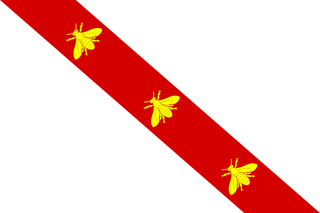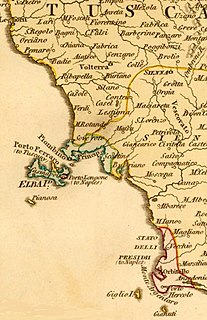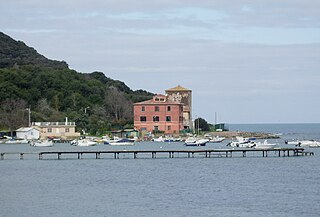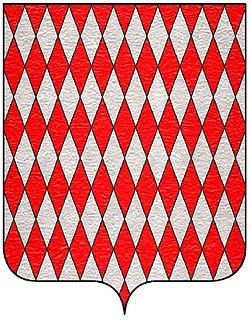This page is based on this
Wikipedia article Text is available under the
CC BY-SA 4.0 license; additional terms may apply.
Images, videos and audio are available under their respective licenses.

Elba is a Mediterranean island in Tuscany, Italy, 10 kilometres (6.2 mi) from the coastal town of Piombino, and the largest island of the Tuscan Archipelago. It is also part of the Arcipelago Toscano National Park, and the third largest island in Italy, after Sicily and Sardinia. It is located in the Tyrrhenian Sea about 50 kilometres (30 mi) east of the French island of Corsica.

The Tuscan Archipelago is a chain of islands between the Ligurian Sea and Tyrrhenian Sea, west of Tuscany, Italy.

Lioni is a town and comune in the province of Avellino, Campania, southern Italy.

Pellezzano is a town and comune in the province of Salerno in the Campania region of south-western Italy.

Istrana is a comune (municipality) in the Province of Treviso in the Italian region Veneto, located about 35 kilometres (22 mi) northwest of Venice and about 12 kilometres (7 mi) west of Treviso. As of 31 December 2004, it had a population of 8,223 and an area of 26.3 square kilometres (10.2 sq mi).

Morgano is a comune (municipality) in the Province of Treviso in the Italian region Veneto, located about 30 kilometres (19 mi) northwest of Venice and about 12 kilometres (7 mi) west of Treviso.

Resana is a comune (municipality) in the Province of Treviso in the Italian region Veneto, located about 35 kilometres (22 mi) northwest of Venice and about 25 kilometres (16 mi) west of Treviso. As of 31 December 2004, it had a population of 8,186 and an area of 25.0 square kilometres (9.7 sq mi).

Zero Branco is a comune (municipality) in the Province of Treviso in the Italian region Veneto, located about 20 kilometres (12 mi) northwest of Venice and about 10 kilometres (6 mi) southwest of Treviso.

Loreggia is a comune (municipality) in the Province of Padua in the Italian region Veneto, located about 35 kilometres (22 mi) northwest of Venice and about 20 kilometres (12 mi) northeast of Padua.

Porto Azzurro is a comune (municipality) in the Province of Livorno in the Italian region Tuscany; it is on the island of Elba, located about 130 kilometres southwest of Florence and about 90 kilometres (56 mi) south of Livorno. It was formerly called Porto Longone, and in 1557 Iacopo VI Appiani, Prince of Piombino, granted Spain the right to build a fortress there. It was transferred to the Kingdom of Naples in 1735 under the terms of the 1725 Treaty of Vienna, and then to France in 1801, when Napoleon established the Kingdom of Etruria.

Scarlino is a comune (municipality) in the Province of Grosseto in the Italian region Tuscany, located about 100 km (62 mi) southwest of Florence and about 25 km (16 mi) northwest of Grosseto.

The State of the Presidi was a small state in Italy between 1557 and 1801. It consisted of five towns on the Tuscan coast—Porto Ercole and Porto Santo Stefano on the promontory of Monte Argentario, as well as Orbetello, Talamone and Ansedonia—and their hinterland, along with the islet of Giannutri and the fortress of Porto Longone on the island of Elba. Always a separate entity attached to the Kingdom of Naples, the Presidi went through three distinct historical periods. They were, from 1557 to 1707, a possession of the Crown of Spain administered by the Spanish Habsburg viceroy of Naples; from 1708 to 1733, a possession of the Austrian Habsburgs administered by their viceroy in Naples; and from 1733 to 1801, a dependency of the Spanish Bourbon kings of Naples. By the Treaty of Florence of 28 March 1801, the king of Naples ceded the Presidi to the French Republic, which then ceded them to the new Kingdom of Etruria. After the downfall of France in 1814 and the Congress of Vienna in 1815, the territories were granted to the restored Grand Duchy of Tuscany.
Atletico Piombino is an Italian association football club located in Piombino, Tuscany. It currently plays in Eccellenza. Its colors are light blue and black.

Baratti is a village frazione of the comune of Piombino in the Province of Livorno, with roughly only 15 residents.

Punta Ala is a frazione of the town of Castiglione della Pescaia, in the province of Grosseto, Tuscany, Italy. It is a famous seaside resort which lies at the bottom of the northern hillsides of the promontory of the same name.

The Principality of Lucca and Piombino was created in July 1805 by Napoleon I for his beloved sister Elisa Bonaparte. It was a State located on the central Italian Peninsula, reporting to the needs of Napoleonic France.

The Appiani is an Italian noble family, originally from Al Piano or Appiano, a now disappeared toponym identified with the modern La Pieve in the comune of Ponsacco. They held the principality of Piombino from the early 15th century until 1628.
















